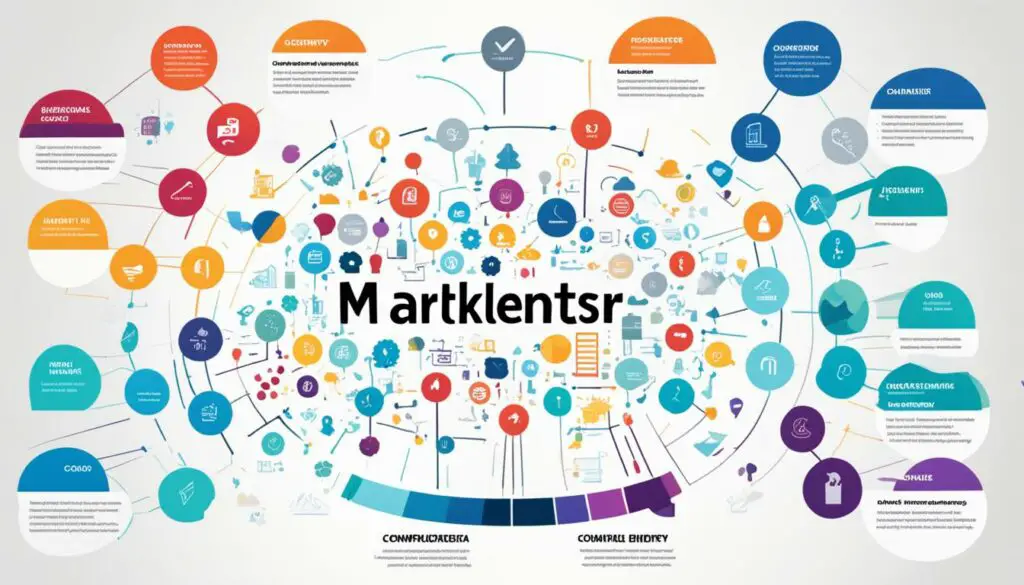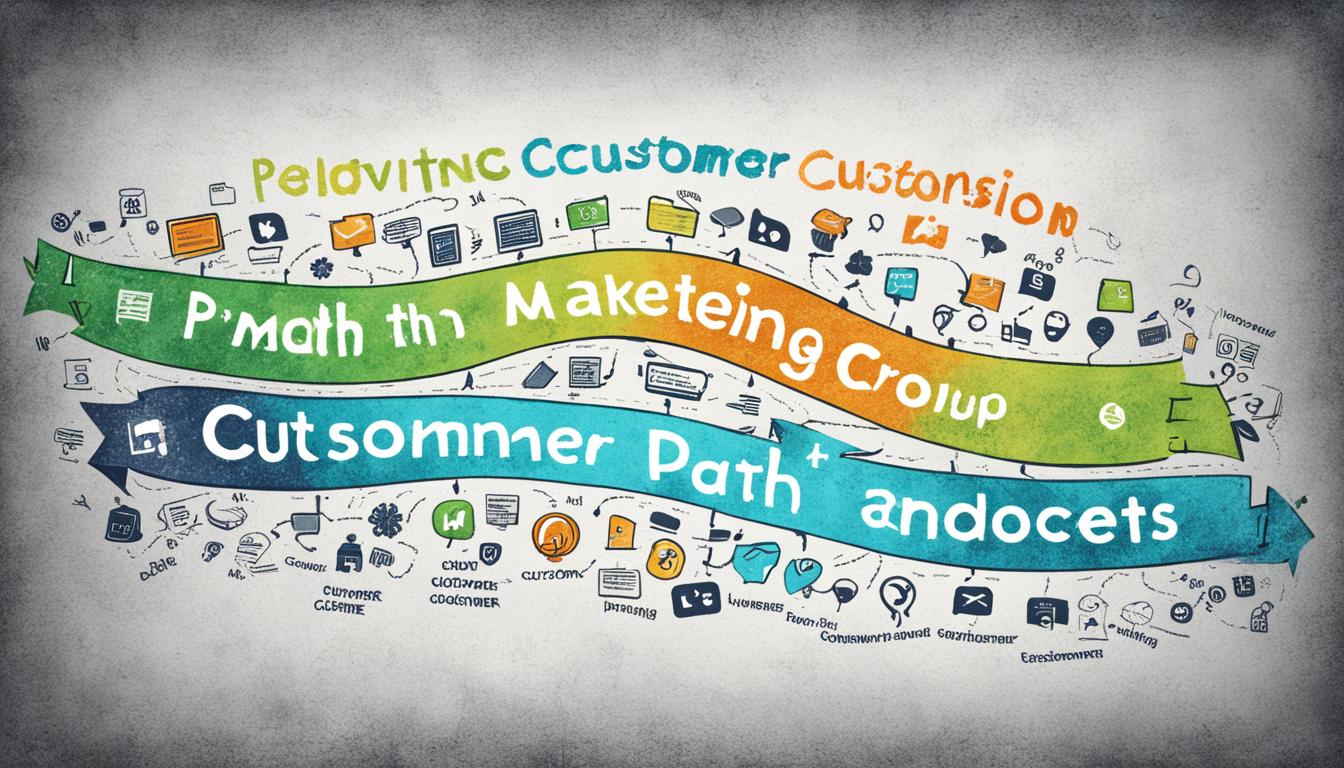Marketing is a dynamic and diverse field that offers a range of career opportunities in large corporations. Whether you have a creative or analytical background, there is a place for you in marketing. In this article, we will explore the different marketing jobs available, how to get into marketing, and the education and skills required for success.
Key Takeaways:
- Marketing offers a variety of career opportunities in large corporations.
- Both creative and analytical backgrounds are valuable in marketing.
- Understanding the different marketing jobs and their requirements can help you choose the right career path.
- Education in marketing or related fields and developing essential skills are crucial for success in marketing.
- Continuous learning and staying updated on industry trends are important in the ever-evolving marketing field.
Education and Skills for Marketing Careers
To have a successful marketing career in a big company, a bachelor’s degree in fields such as marketing, management, business, economics, psychology, communications, public relations, or journalism is recommended. A master’s degree or MBA can also be beneficial for career growth. Internships and co-op programs provide valuable real-life experience, and developing skills in creativity, problem-solving, passion for numbers, and curiosity is essential for marketing professionals.
If you aspire to work in Fortune 500 companies or secure prestigious marketing job openings, a solid educational background and relevant skills are highly valued. Many large corporations seek candidates with a strong foundation in marketing principles and theories. A bachelor’s degree is often a minimum requirement for entry-level positions in renowned companies.
Furthermore, a master’s degree or MBA can open doors to advanced opportunities and higher-level management roles in marketing departments. These additional qualifications demonstrate a deeper understanding of marketing strategy and business acumen.
Real-world experience is just as essential as academic achievement. Internships and co-op programs allow aspiring marketers to gain practical skills, learn from industry professionals, and build a network of connections. These experiences give candidates a competitive edge when applying for prestigious marketing positions in top companies.
While formal education provides a strong foundation, the skills required for marketing success extend beyond the classroom. Marketing professionals must be creative, able to think critically, and problem-solve effectively. A passion for numbers and data analysis is crucial, as marketing decisions are often driven by insights and analytics. Curiosity is also important, as staying up-to-date with industry trends and emerging technologies is essential in this rapidly evolving field.
The Marketing Job Market
Looking for high-paying marketing jobs or senior marketing roles? The marketing job market is brimming with opportunities for top marketing professionals. With an expected growth rate of 10% from 2020 to 2030, the demand for marketing talent is on the rise.
Marketing jobs are available in various companies, ranging from large firms to startups, small businesses, and even nonprofits. The diverse range of organizations ensures that there are ample opportunities to find the right fit for your skills and interests.
What’s more, remote marketing jobs have become increasingly prevalent, providing flexibility and the chance to work from anywhere. With the growing emphasis on remote work, many companies are now open to hiring marketing professionals who can effectively carry out their roles from a virtual environment.
LinkedIn is an invaluable resource for researching top companies offering high-paying marketing roles. It not only allows you to explore job listings but also provides insights into innovation in branding and emerging marketing job opportunities. Keep an eye on industry trends and stay abreast of new developments to position yourself for success in this dynamic field.
Top Marketing Roles
| Role | Responsibilities | Qualifications |
|---|---|---|
| Marketing Manager | Develop and implement marketing strategies, oversee campaigns, analyze data, manage team | Bachelor’s degree in marketing or related field, strong leadership and analytical skills |
| Brand Manager | Manage brand identity, develop brand strategies, monitor brand performance | Bachelor’s degree in marketing or related field, creative thinking, excellent communication skills |
| Sales Manager | Oversee sales team, set sales targets, develop sales strategies, monitor performance | Bachelor’s degree in marketing or related field, strong sales and negotiation skills |
Digital Marketing Careers
Digital marketing has become an integral part of the business landscape with the rapid growth of the internet and smartphones. As companies strive to reach a larger online audience, digital marketing professionals play a crucial role in driving brand awareness, lead generation, and customer engagement. The field of digital marketing offers a diverse range of career opportunities for individuals with a passion for technology, creativity, and strategic thinking.
Search Engine Optimization (SEO) and Search Engine Marketing (SEM)
Search engine optimization (SEO) and search engine marketing (SEM) are key components of digital marketing that focus on optimizing web content to improve organic search engine rankings and drive targeted traffic to websites. SEO specialists work on optimizing on-page elements, such as website structure, content quality, and keyword usage, to enhance visibility in search engine results. SEM professionals, on the other hand, leverage paid advertising platforms like Google Ads to increase website visibility and drive immediate traffic through targeted search engine ads.
Whether it’s improving organic rankings or running targeted search ads, digital marketers proficient in SEO and SEM strategies are in high demand. They help businesses enhance their online presence, attract qualified leads, and drive sales conversions through effective search engine strategies.
Other Digital Marketing Careers
In addition to SEO and SEM, there are various other digital marketing career paths available. Here are some key roles in the field:
- Content Marketing: Content marketers develop and distribute engaging and valuable content to attract and retain a target audience, driving profitable customer actions.
- Product Marketing: Product marketers specialize in promoting and positioning specific products or services within the market, identifying key features and benefits to drive customer adoption and revenue growth.
- Brand Marketing: Brand marketers work to build and maintain a strong brand identity through strategic messaging, creative campaigns, and brand consistency across channels.
- Event Marketing: Event marketers plan and execute marketing activities for live and virtual events, maximizing attendee engagement and generating leads or sales opportunities.
- Niche Marketing: Niche marketers focus on a specialized segment of the market, tailored to the specific needs and preferences of a particular target audience.
- Marketing Analysis: Marketing analysts collect, analyze, and interpret data to identify trends, measure campaign effectiveness, and uncover insights to drive data-driven marketing strategies.
- Marketing Strategy: Marketing strategists develop comprehensive marketing plans, aligning business goals with data-driven strategies to drive growth and achieve competitive advantage.
These various digital marketing careers offer professionals the opportunity to work across different sectors, industries, and marketing channels, utilizing their skills and expertise to make a significant impact on a company’s digital presence and overall marketing success.
Entry-Level Marketing Jobs
Entry-level marketing jobs provide a starting point for professionals without previous marketing experience. These roles open up various opportunities for individuals to build their marketing careers in big companies. Whether you are a recent graduate or looking to transition into a new field, entry-level marketing jobs offer a valuable stepping stone towards success.
There are several job titles available in this stage of the marketing career path, including:
- Marketing Coordinator
- Social Media Coordinator
- Project Coordinator
- Event Marketing Coordinator
These roles play a crucial role in supporting higher-level marketing professionals and contribute to the overall marketing strategy of the company. As an entry-level marketing professional, you will have the opportunity to assist with research, customer service, administrative tasks, and various marketing initiatives.
Entry-level marketing jobs provide hands-on experience and exposure to different aspects of marketing, helping you develop a strong foundation in this dynamic field. It is an excellent opportunity to learn from experienced marketers, gain industry knowledge, and refine your marketing skills.
For example, as a Marketing Coordinator, you will assist in the implementation of marketing campaigns, conduct market research, analyze data, and collaborate with cross-functional teams. Social Media Coordinators, on the other hand, will focus on managing social media platforms, creating engaging content, and monitoring social media trends.
Here is a glimpse of what each role entails:
| Role | Responsibilities |
|---|---|
| Marketing Coordinator | Assisting with marketing campaigns, conducting market research, analyzing data, collaborating with cross-functional teams. |
| Social Media Coordinator | Managing social media platforms, creating engaging content, monitoring social media trends. |
| Project Coordinator | Coordinating marketing projects, managing timelines, liaising with stakeholders, ensuring project success. |
| Event Marketing Coordinator | Planning and executing marketing events, coordinating logistics, managing event budgets, ensuring attendee satisfaction. |
Entry-level marketing jobs provide an opportunity to learn, grow, and pave the way for future career advancements. It is the first step towards a rewarding marketing career in which you can make a significant impact on the company’s success.

Marketing Manager and Director Roles
As professionals gain experience in marketing, they can progress to roles such as marketing manager and marketing director. Marketing managers are responsible for implementing marketing strategies and may specialize in areas such as brand management, product management, or marketing communications. Marketing directors oversee the overall marketing strategy and may hold titles such as director of marketing research, director of advertising sales, or director of media.
Marketing Manager Responsibilities:
- Develop and implement marketing strategies and campaigns.
- Manage and coordinate marketing team members and projects.
- Analyze market trends and competitor activities to identify opportunities.
- Collaborate with cross-functional teams to ensure effective marketing execution.
- Monitor and measure the success of marketing campaigns.
- Stay updated on industry trends and best practices.
Marketing Director Responsibilities:
- Develop and execute the overall marketing strategy of the organization.
- Set marketing goals and objectives to align with business objectives.
- Manage and lead a team of marketing professionals.
- Oversee the planning and implementation of marketing campaigns.
- Ensure brand consistency across all marketing efforts.
- Analyze market data and customer insights to drive marketing decisions.
| Marketing Manager | Marketing Director |
|---|---|
| Responsible for implementing marketing strategies | Oversees the overall marketing strategy |
| Specializes in areas such as brand management, product management, or marketing communications | May hold titles such as director of marketing research, director of advertising sales, or director of media |
| Manages and coordinates marketing team members and projects | Manages and leads a team of marketing professionals |
| Analyzes market trends and competitor activities | Analyzes market data and customer insights |
| Collaborates with cross-functional teams | Sets marketing goals and objectives |
Vice President of Marketing and Chief Marketing Officer
The next steps in the marketing career path are the roles of Vice President of Marketing (VP of Marketing) and Chief Marketing Officer (CMO). These senior-level positions involve leading marketing teams, developing and executing marketing strategies, and ensuring the success of marketing initiatives. The VP of Marketing focuses on the marketing strategy itself, while the CMO oversees all areas of marketing and reports to the CEO.
As a VP of Marketing or CMO, you will be responsible for driving the company’s marketing efforts and achieving business goals through effective marketing strategies. Your role will involve managing and mentoring a team of marketing professionals, analyzing market trends and consumer insights, and developing strategic marketing plans to promote the company’s products or services.
One of the key responsibilities of a VP of Marketing or CMO is to lead marketing initiatives that align with the company’s overall goals and objectives. This includes creating and implementing integrated marketing campaigns, conducting market research, monitoring the effectiveness of marketing activities, and making data-driven decisions to optimize marketing efforts.
In addition to leading marketing initiatives, a VP of Marketing or CMO also plays a crucial role in building and maintaining strong relationships with key stakeholders, including internal teams, external partners, and customers. Collaboration and effective communication skills are essential in these positions to drive cross-functional teamwork and ensure the success of marketing campaigns and projects.
Key Responsibilities of a VP of Marketing or CMO:
- Develop and execute strategic marketing plans
- Manage and mentor a team of marketing professionals
- Analyze market trends and consumer insights
- Create and implement integrated marketing campaigns
- Monitor and measure the effectiveness of marketing activities
- Build and maintain relationships with key stakeholders
- Collaborate with cross-functional teams
- Stay updated on industry trends and best practices
- Drive innovation and creativity in marketing strategies
As a VP of Marketing or CMO, you will have the opportunity to make a significant impact on the growth and success of the company. Your marketing expertise, leadership skills, and strategic vision will be instrumental in driving business results and establishing the company as a leader in the industry.
Continuing Education and Trends in Marketing
To stay competitive and advance in the marketing field, continuing education is important. Marketers can pursue certifications, attend conferences and workshops, and stay updated on industry trends. The marketing landscape is constantly evolving, with new technologies and strategies emerging. It’s essential for marketers to adapt and stay curious to succeed in this dynamic industry.
Educational Opportunities
Continuing education plays a vital role in the marketing industry, allowing professionals to enhance their knowledge and skills. By pursuing certifications, marketers can demonstrate their expertise in specific areas of marketing, such as digital marketing, social media marketing, or data analytics. Some notable certifications in marketing include:
- Google Ads Certification
- HubSpot Inbound Certification
- Facebook Blueprint Certification
- Hootsuite Social Marketing Certification
- Google Analytics Individual Qualification (IQ) Certification
Attending marketing conferences and workshops provides valuable networking opportunities and allows marketers to learn from industry experts. Some popular marketing conferences include:
- Content Marketing World
- INBOUND
- Social Media Marketing World
- MarketingProfs B2B Marketing Forum
- Adobe Summit
Additionally, marketers can stay updated on industry trends by following influential marketing blogs, subscribing to industry newsletters, and participating in online communities. This continuous learning helps marketers stay ahead of the curve and make informed decisions to drive successful marketing campaigns.
Trends in Marketing
Being aware of the latest trends in marketing allows professionals to adapt their strategies and remain competitive. Here are some current marketing industry trends:
- Personalization: Tailoring marketing campaigns and messaging to individual consumers, using data-driven insights and automation tools.
- Influencer Marketing: Collaborating with social media influencers to promote products and services to their audiences.
- Video Marketing: Harnessing the power of video content to engage and captivate audiences across various platforms, including social media and websites.
- Voice Search Optimization: Optimizing content for voice search queries, as voice assistants like Siri and Alexa become increasingly prevalent.
- Artificial Intelligence: Utilizing AI-powered tools and technologies to automate processes, analyze data, and personalize customer experiences.
- Customer Experience: Focusing on creating seamless and personalized experiences for customers at every touchpoint throughout their journey.
To stay ahead in the marketing industry, marketers must embrace these trends and leverage new technologies and strategies to deliver impactful and successful marketing campaigns.
Top Marketing Certifications
| Certification | Issuing Organization |
|---|---|
| Google Ads Certification | |
| HubSpot Inbound Certification | HubSpot |
| Facebook Blueprint Certification | |
| Hootsuite Social Marketing Certification | Hootsuite |
| Google Analytics Individual Qualification (IQ) Certification |
Conclusion
Marketing offers a wide range of career paths and exciting opportunities for professionals in big companies. With the right education, skills, and experience, individuals can thrive in various roles such as marketing coordinator, marketing manager, VP of Marketing, and CMO. Continuous learning and staying updated on industry trends are crucial for long-term success in the marketing field.
Whether you have a creative or analytical background, there is a marketing career path waiting for you in prominent companies. Pursuing a Bachelor’s degree in fields like marketing, management, business, economics, psychology, communications, public relations, or journalism is recommended. An advanced degree, such as a Master’s or MBA, can also boost your chances of securing high-level marketing positions.
As the marketing job market continues to grow, it is essential to keep up with the latest digital marketing trends. Roles in areas like search engine optimization (SEO), search engine marketing (SEM), content marketing, and marketing analysis are in demand. Entry-level positions, such as marketing coordinator or social media coordinator, provide a stepping stone to higher-level roles.
Remember, the key to success in marketing lies in creativity, problem-solving skills, a passion for numbers, and curiosity. By continually expanding your knowledge, developing these skills, and embracing new technologies, you can position yourself for a rewarding marketing career in prominent companies.
FAQ
What are the different marketing jobs available in big companies?
There are various marketing jobs available in big companies, including roles such as marketing coordinator, social media coordinator, project coordinator, event marketing coordinator, marketing manager, marketing director, Vice President of Marketing (VP of Marketing), and Chief Marketing Officer (CMO).
What education and skills are required for marketing careers in big companies?
For marketing careers in big companies, it is recommended to have a bachelor’s degree in fields such as marketing, management, business, economics, psychology, communications, public relations, or journalism. A master’s degree or MBA can also be beneficial. Skills in creativity, problem-solving, passion for numbers, and curiosity are important for success in marketing.
What is the job market like for marketing roles in big companies?
The marketing job market is thriving, with an expected growth rate of 10% from 2020 to 2030. There are high-paying marketing jobs available, including senior marketing roles and top marketing positions in big companies.
What are digital marketing careers and what do they entail?
Digital marketing careers involve roles such as search engine optimization (SEO) and search engine marketing (SEM) which focus on optimizing web content for search engines. Other digital marketing careers include content marketing, product marketing, brand marketing, event marketing, niche marketing, marketing analysis, and marketing strategy.
What are some entry-level marketing jobs in big companies?
Entry-level marketing jobs in big companies include positions such as marketing coordinator, social media coordinator, project coordinator, and event marketing coordinator. These roles involve assisting with research, customer service, administrative tasks, and supporting higher-level marketing professionals.
What are the roles of marketing managers and directors in big companies?
Marketing managers are responsible for implementing marketing strategies in big companies and may specialize in areas such as brand management, product management, or marketing communications. Marketing directors oversee the overall marketing strategy and may hold titles such as director of marketing research, director of advertising sales, or director of media.
What are the roles of a Vice President of Marketing and Chief Marketing Officer in big companies?
The Vice President of Marketing (VP of Marketing) focuses on the marketing strategy itself in big companies, while the Chief Marketing Officer (CMO) oversees all areas of marketing and reports to the CEO. Both positions involve leading marketing teams, developing and executing marketing strategies, and ensuring the success of marketing initiatives.
How important is continuing education in the marketing field and staying updated on industry trends?
Continuing education is important in the marketing field to stay competitive and advance in big companies. Marketers can pursue certifications, attend conferences and workshops, and stay updated on industry trends. The marketing landscape is constantly evolving, and it’s essential for marketers to adapt and stay curious to succeed.
What career opportunities are available in big companies for marketing professionals?
Marketing professionals can find career opportunities in big companies as marketing coordinators, marketing managers, Vice Presidents of Marketing (VPs of Marketing), and Chief Marketing Officers (CMOs). These roles offer the opportunity for growth and advancement in prestigious marketing job openings.




